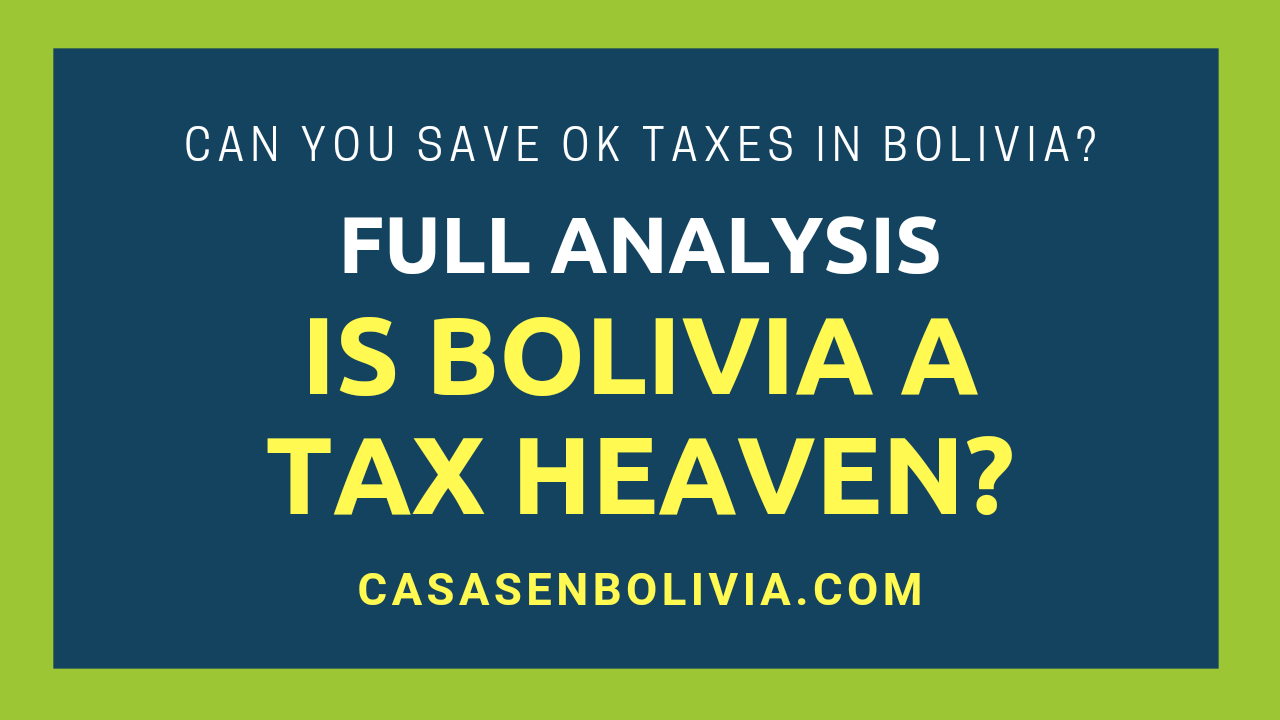Last Updated on February 15, 2025
As you may know, there are numerous tax havens and tax shelters worldwide. But is Bolivia one of them? The country has some crucial taxes you need to be aware of, and they apply to almost everyone, in nearly every situation, without offering significant advantages to foreigners.
In Bolivia, both individuals and companies must pay a VAT tax of 13% on the sales price every month, as well as a corporate income tax of approximately 25% annually. This applies equally to foreign individuals and firms. In Bolivia, you’ll rarely pay less than 20% in taxes on your revenue.
Here, we’ll discuss whether Bolivia qualifies as a tax haven or tax shelter. You’ll learn about the principal taxes that businesses and individuals typically pay each month or year on their commercial activities within the country, along with other relevant details and figures. We are real estate experts and citizens of Bolivia who have lived here our entire lives.
Is Bolivia on the Verge of Becoming a Tax Haven?
Based on the details below, you’ll see that Bolivia is far from becoming a tax haven or tax shelter. The reason is that nearly all individuals and businesses are required to pay taxes, typically exceeding 15% of their net income, and in many cases reaching 20% or 25%. Furthermore, they must pay a VAT tax (called IVA) of 13% on the selling price of almost any good or service they sell.
1) Lower Tax Rates
Personal Taxes
Individuals with low incomes in Bolivia are typically exempt from paying significant taxes on their commercial activities, *but we’re referring to individuals earning around $1,000 or less per month*. Individuals earning more than this threshold will generally have to pay:
- Approximately 10% to 15% in taxes on their net annual income if they are professionals with formal employment.
- Around 25% of their net income if they engage in activities unrelated to their professions or that don’t require professional education.
These rules apply equally to individuals from overseas, foreigners, tourists, residents of all types, and Bolivian citizens. Bolivian law doesn’t provide any advantages to individuals or firms from other countries in tax matters; they are treated the same as Bolivians.
Business Taxes
On the other hand, regarding businesses, unless the business is very small – meaning it handles capital of around $3,000 to $5,000 per month or has a gross yearly income of around $15,000 to $20,000 – it will be required to pay the Corporate Income Tax (called IUE) that all firms typically must pay in the country.
These tiny businesses also need to be operating in specific sectors – *food, crafts, or very small retail activities* – to be exempt from paying the IUE tax.
Therefore, for example, if a business:
- Receives a gross income of only $10,000 during the year while operating in the food sector, with $3,000 of that being revenue, then in this case, it will only need to pay around $50 in income taxes (exempt from the IUE).
- Receives a gross income of approximately $30,000 per year, with $5,000 of that being revenue, then it will have to pay the full Corporate Income Tax of 25% of this revenue, which is $1,250.
- Receives a gross income of around $1 million for the entire year, with $100,000 of that being revenue, regardless of the sector, it will need to pay a Corporate Income Tax of $25,000 in income taxes at the end of the year.
So, the only way to avoid paying business income taxes in Bolivia *is to be very small* and also operate in the food, crafts, or small commerce sectors, in which case the tax will only be a few tens or hundreds of dollars, regardless of the company’s income.
Otherwise, it will need to pay 25% of its yearly net income in all cases, regardless of whether it’s a Bolivian or foreign company or individual.
2) Privacy for Company Owners
There’s another situation we need to consider regarding the privacy a company can maintain in its finances in Bolivia.
In general, Bolivian law stipulates that any income registered by any bank that *exceeds $10,000 must have a sworn declaration attached*. Therefore, if you have significant financial or business operations within the country, the government and banks have the right to investigate your finances.
Although banking and financial entities don’t always conduct these investigations, they certainly do so with some suspicious companies or companies they deem worthy of scrutiny.
3) Fewer Procedures
In Bolivia, you’ll find that establishing a company is relatively straightforward once you become a resident of some type (not just a tourist). However, the process of paying taxes is more complex and requires more steps. This process is not as streamlined as in developed countries.
4) Access to Deductions
As we mentioned earlier, in Bolivia, both locals and foreigners are treated equally under the law. Bolivia’s Constitution states that foreigners and Bolivians have equal rights under the legal system and regulations. Once you obtain your foreigner’s ID card, you are subject to the same tax and legal regulations as any other Bolivian within the country.
This means that you cannot enjoy any type of tax advantage *solely because you are from another country*. Also, if your company is established in Bolivia, it will be treated as a Bolivian legal entity, subject to all applicable taxes. If your company is from overseas and is established in Bolivia, you will still need to pay all the taxes mentioned previously; there are no real tax advantages.
5) Tax Rates and the Tax System
The business income tax and the VAT tax (IVA) in Bolivia *are not the only taxes you’ll have to pay* if you are operating within the country. There are other applicable taxes, which we list here:
- Individual Income Tax (IUE) (approximately 5% to 20% of net income, depending on the size of the activities) or Business Income Tax (IUE) (always 25% of net income, unless it’s a very small business, in which case a few hundred dollars will be paid).
- The equivalent of the VAT tax (IVA) in Bolivia, which is 13% of the sales price of the good or service, paid in all cases except for education, crafts, arts, or small commerce.
- The Transactions Tax (IT), which is paid on every transaction conducted within the country; it’s 3% of the total purchase amount.
- The Financial Transactions Tax (ITF), which is paid on every financial transaction conducted within the banking system; it’s 0.005% of the total transaction amount.
- The Wealth Tax, any individual with assets of $4.3 million or more must pay this additional yearly tax of 1.4% to 2.4% on total assets. Therefore, if you own a company or assets that collectively reach this level, you’ll also need to pay this tax.
- Additional employer contributions, such as medical care, retirement funds, severance pay, and other similar benefits. While conducting your day-to-day operations, you’ll also need to pay these contributions to employees, and they typically amount to about 40% of the employee’s nominal salary.
Therefore, at the end of the day, either as a company or a large individual in Bolivia, you’ll have to pay, combining all the taxes mentioned above (*this is a general estimation and may vary significantly*), approximately 25% to 40% of your gross income.
This means that if, for example, you receive $100,000 from your clients during a year from the sales you made during that time, then you’ll need to pay approximately $20,000 to $30,000 in taxes in Bolivia.
Other Important Nuances of Bolivia’s Tax Policy for Foreign Companies
Now let’s examine some important nuances regarding how companies are treated under Bolivian law and by the Bolivian tax system. As previously stated, both Bolivian and foreign companies or individuals conducting operations in Bolivia are treated identically under the country’s laws.
Source Principle in Bolivia
Bolivia applies the source principle, meaning that any type of commercial activity generating revenue for a company will be taxed based on where it was conducted or performed.
Therefore, any type of industrial or commercial activity conducted within Bolivia’s borders is subject to all the taxes mandated by Bolivian law, as previously mentioned.
On the other hand, if the business activity is conducted outside the country’s territory, it’s not subject to Bolivian taxes.
Double Taxation in Bolivia
Bolivia also has some agreements with other countries, primarily in South America, to easily eliminate the double taxation issue that might exist for companies or individuals from these countries.
However, there is no specific double taxation agreement between Bolivia and the US or Canada. Therefore, to avoid this possibility, you’ll need to complete more paperwork, encountering more challenges.
In addition to this, many European countries have specific double taxation agreements already established with Bolivia.
Is Bolivia More Favorable for Tax Regulations?
Currently, we observe that Bolivia’s tax system has remained largely unchanged. The same laws have been in effect for decades, and they remain roughly the same today.
Therefore, we anticipate that in the future, regardless of the type of government in power, the tax system and its regulations for both Bolivians and foreigners will not change significantly.
You also need to understand that Bolivia’s tax institutions and tax system are often highly bureaucratic and operate on outdated systems that are difficult to navigate for both individuals and corporations. It’s actually challenging to pay taxes in the country.
Offshore and Shell Companies in Bolivia
If you wish to relocate your international and commercial activities to a Bolivian company, it’s legally possible to do so, as opening a company as a tourist in Bolivia is permitted. However, in most cases, it’s significantly better for you to be a resident of Bolivia, rather than just a tourist, to establish a company here.
Once your company is established within the country, you’ll be subject to the same tax regulations as any other Bolivian company, and you’ll need to pay the appropriate taxes for your activities.
We discuss in detail the process of opening a company in Bolivia as a foreigner, including all the requirements and steps, in the following guide: How to open a company in Bolivia: all you need to know. Link
Regarding shell companies in Bolivia, establishing a firm within the country isn’t particularly difficult. However, when banks realize that the owner is a foreigner, they’ll exercise greater caution when opening bank accounts for these companies. Also, if you conduct transactions exceeding $10,000, it will raise suspicion within the banking system, and they may, in many cases, investigate the finances and operations behind the business.
Conclusions:
In this article addressing whether Bolivia is a tax haven, you’ve seen that the country is currently far from qualifying as such. With taxes that don’t differentiate between locals and foreigners and reach levels of 15% to 40% of gross income in almost all cases, it’s difficult to classify Bolivia as a tax haven, unless you’re a very small business.
You’ve seen that Bolivia applies taxes based on the source principle. It doesn’t matter whether you’re a Bolivian or foreign company or individual; if your industrial or commercial activities are created and conducted within the country, you’ll be subject to various types of taxes.
These taxes include the VAT tax (IVA) at 13% of the sales price, the business or individual income tax (IUE) ranging from 15% to 25% of annual net profits, the IT tax at 3% of any transaction, the ITF at 0.005% of any financial transaction, the wealth tax for assets exceeding $4.3 million, and additional contributions for employees and severance payments.
We hope this information has been helpful. If you’d like to learn more about all the taxes applied to Bolivian companies and commercial activities, their regulations, tax rates, payment methods, etc., please visit our comprehensive guide: [Link].
CasasenBolivia.com, information on living, working, investing, and traveling in Bolivia.








